For every owner of a private home, it is necessary to ensure the most economical maintenance of their own home. Particular attention is paid to heating systems. They are based not only on the criteria of efficiency, but also on safety, practicality, ease of setup and installation.
In connection with this approach to business, property owners often have the question of which heating is best for a private home. If there is a gas pipeline nearby, or the site already has a gas connection, then rarely does anyone conduct a thorough analysis and comparison with alternative ways heating, because for now this type of fuel can be classified as inexpensive. However, it is worth thinking about the prospects when comparing heating with different types of fuel.
How to make a choice
Most systems are based on a basic element - a boiler, which provides the coolant with enough energy to distribute it evenly over the entire area of the room. It is reasonable to choose the device that best fits the geometric data into the space allocated for it.
To guide you, which heating system is better is based on the following characteristics:
- the type of equipment is selected, while the main heat generator can be diesel, electric, run on gas or solid fuel, and also in some situations have versatility, switching from consuming one type of fuel to another type;
- The boiler can be mounted either wall-mounted, suspended on brackets, or floor-mounted in any convenient residential area, in special cases boilers require not a place in the room, but a whole room, a full-fledged boiler room that is capable of performing its functions as efficiently as possible;
- by the number of circuits it is easier to determine which heating is better, because the second circuit will go hot domestic water however, its absence will reduce the cost of installation and operation.
Classic oven
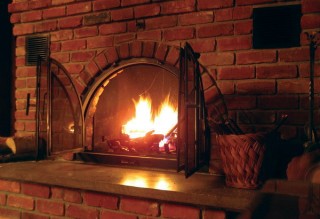
The question is what better heating for a private home, has become relevant with the spread of a wide number of different heating devices. Previously, the central generator of thermal energy was a classic solid fuel stove, which is still preserved in its original form in some settlements.
She has many positive qualities:
- with its help it is possible to quickly and easily heat the room and all residents;
- it is, as a rule, built together with the building itself, so its cost is included in the house design and does not require additional subsequent investments;
- firewood - the main fuel for this heating option can be found almost everywhere.
When choosing which heating system is best for your home, you should take into account the disadvantages of a solid fuel stove:
- incorrect laying out in the early stages can lead to some of the smoke spreading throughout the room or uneven heating of the surface;
- low autonomy and the need to store fuel nearby repels most users from this option;
- It is not suitable for large areas, since the heat from it spreads slowly.
To solve the problem of heating several rooms, the stove is installed on several outlets at once - in this case, the entire house can be heated evenly.
Fireplace application
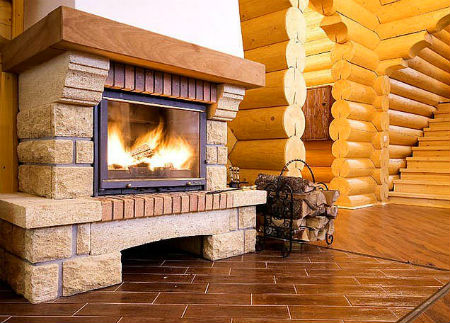
One of the elegant and aesthetic ways to heat homes, both urban and suburban, is the use of fireplaces. With their help, it is easy and quick to warm up large rooms. If anyone still has doubts about which heating is best for a romantic evening in a country cottage, then choose a fireplace. The crackling of logs, a light aroma, the flickering of a flame - what could be more romantic?
The disadvantages of this method are:
- high cost of heat production;
- poor practicality of the method;
- an open fire in the house if handled improperly is quite dangerous;
- laying out a fireplace is not a cheap pleasure.
In apartments where heating is provided by a central line, you can install false fireplaces, which recreate the atmosphere, but do not provide heat.
Coolant water

Even the installation difficulties do not frighten those who, wanting to figure out which heating is better in a private home, opt for a water heating system. This means that hot water will circulate through the pipes, heating the rooms. Any heating device can act as a heater - a stove, solid fuel, gas or electric boiler, etc. A huge selection of equipment and related products will provide not only simple installation, but also a high degree of maintainability, accessibility to maintenance and the possibility of good savings.
If you decide to use a gas boiler, then in some cases (in the absence of a connection) this can become a heavy financial burden, which not everyone strives for voluntarily. For such cases, you can use boilers using other types of fuel:
- liquid (diesel fuel or fuel oil);
- solid (pellets or coal);
- electrical system.
Diesel heating consumes approximately 0.5-0.9 liters per hour in an average room. The oil boiler smells bad during operation. Electric units consume excessive amounts of electricity to be classified as energy efficient.
Very popular in regions where there are problems with different types fuels are universal boilers. In this case, there is no need to search for which heating is better in a private home, because the user has the opportunity to test several types of fuel and choose the most optimal operating mode. Similar bi-fuel units operate with different types fuel and provide fairly high efficiency, but often require the presence of a person not far from the boiler.
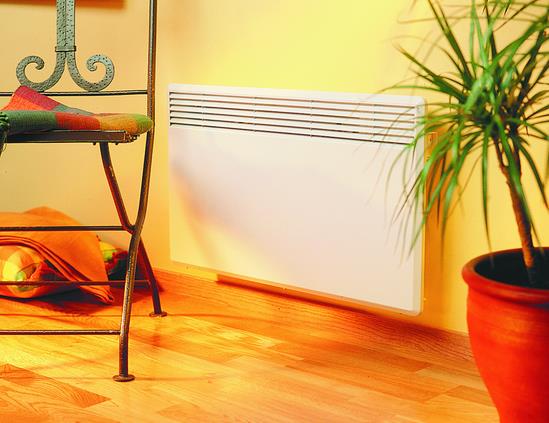
Unfortunately, this type is quite rare among users. The unpopularity is associated with certain legal difficulties. They are regulated in SNiP. The desire to ensure safety during operation of the equipment also leaves its mark.
More widespread electric options convectors. They can first be installed in the form of a parallel or redundant system, and in the off-season their power will be enough to maintain comfortable conditions without starting the main heating.
Heat pumps
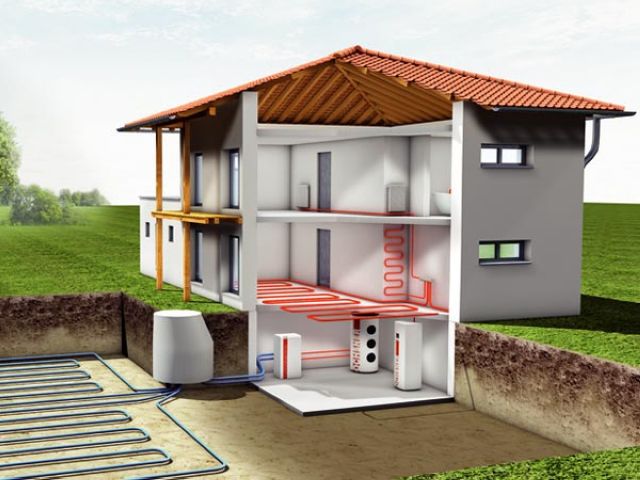
A progressive innovation among home heating systems is the use of heat pumps. This type of heating is widespread in northern Europe, where the earth provides heat in the form of underground geysers or warm fountains. But heat pumps can be used not only in such areas. Their operating principle allows the system to be operated in two modes:
- heating in winter;
- cooling in summer.
For such a function there is no need to even significantly re-equip anything, everything works due to the internal heat of the earth. The disadvantages are the high cost of the work, the need for a large adjacent area to the house or deep drilling.
An exception is the use of water energy when there is no need for a large volume earthworks. Today, heat pumps are still very little widespread in Russia, where gas heating is still more profitable and convenient.
A solution to the issue of popularizing heat pumps could be a change in the government approach with the aim of rationally using natural resources.
It will also reduce the final cost of installing and installing heat pumps large number manufacturers. Today average price pump costs 5-8 thousand euros. The cost of drilling work depends on the region. In terms of other types heating equipment- expensive, but if you calculate how much you save on paying for coolants, the benefits, as they say, are obvious.
VIDEO: Which heating is better for a house or apartment? Using the example of gas, electricity, firewood, coal and pellets
The variety of heating systems for a private home not only amazes with its capabilities, but also causes significant difficulties in choosing. The question arises: which heating system to choose? Which heating is better? The point is, everything existing options heating systems do an excellent job of their main task, but if you do not take into account the conditions in which the heating system will be operated, then it may be inconvenient to use or too costly to maintain.
Heating with solid and liquid fuels
Under solid fuel this should mean firewood, pellets, briquettes, etc. Fireplaces, stoves and boilers for water heating systems operate on this type of fuel. It is well known that fireplaces are ineffective as a heating system and are only good for the interior. Therefore, stoves and solid fuel boilers are of greatest interest.
Compared to other heating systems, stoves are low efficient and labor-intensive to maintain, so even in the absence of other energy sources, it is not advisable to use stoves as the main heating for a private home. However, if we're talking about about a small house that is in winter period is visited infrequently and for a short time, for example, a dacha, then a stove is the best heating system, especially when it comes to gas generator-type stoves. Using a wood-burning stove, you can quickly warm up a room, the cost of fuel and its consumption with this method of operation is low, the cost of the stove is significantly lower than the cost of any other heating system, and installation is simpler.
Increase 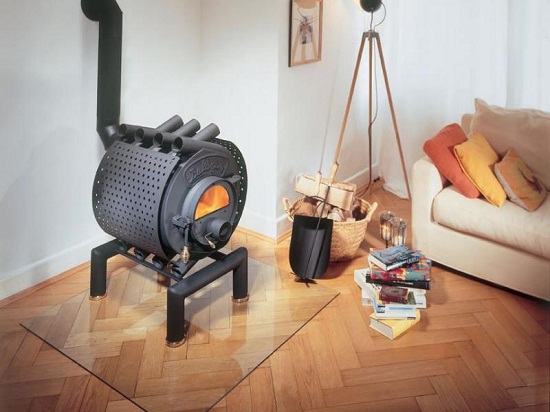
Fig.1.
If the house is intended for permanent residence, there is no gas main and there are interruptions in the power supply, then the only way out is water heating based on a solid fuel boiler. When choosing this type of heating system, you should remember that you must constantly monitor the boiler and the remaining amount of fuel, have a supply of fuel, and you must not leave the boiler unattended. long time, because If the fuel runs out, the heating system will quickly cool down and may defrost.
Increase 
Fig.2.
An alternative to solid fuel boilers are liquefied fuel boilers. Liquefied fuel includes liquefied gas and diesel fuel. Of course, this method of heating a house will cost more than servicing a solid fuel boiler, but such systems require less attention.
Gas heating at home
Most heating systems use gas as the main fuel. The reason is simple, gas heating is the cheapest option. Heating system on natural gas easy to install, and gas boilers are available in various configurations, which allows you to automate the heating system 100%. Considering the ease of operation and low cost energy source is by far the best option for a heating system.
Gas boilers for heating systems can be divided into floor-mounted and wall-mounted. These types of boilers differ in power and installation method.
Floor-standing boilers have greater power and are designed for heating large areas, usually more than 250 square meters. m. Boilers of this type require a special room - a boiler room. The boiler room must have ventilation. Floor-standing boilers require a separate chimney.
Increase 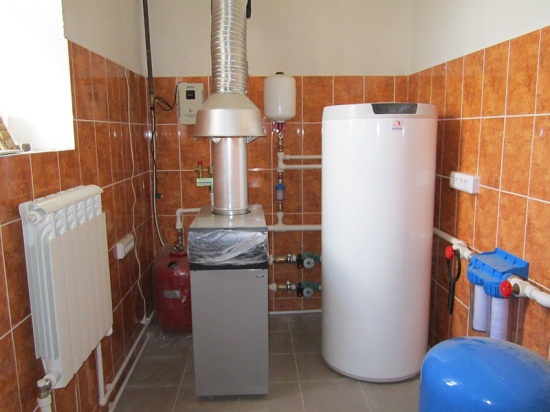
Fig.3.
Wall-mounted gas boilers are more compact and are usually designed for heating a house with an area of up to 250 sq.m. Wall-mounted boilers are equipped with all necessary automation. Most models already have an expansion tank and a circulation pump in their design, which greatly simplifies the installation of the heating system and its adjustment. Some models have 2 heating circuits and are capable of working not only for the heating system, but also for heating water for the water supply of the house.
Increase 
Fig.4.
The most interesting for a small house are boilers with a closed combustion chamber. This type of boiler does not require a separate chimney and boiler room. Exhaust gases and air flow to the boiler are carried out using a coaxial pipe, which is mounted in the wall next to the boiler. Boilers of this type greatly simplify the installation of a heating system. Therefore, provided that the electrical network is stable, this type of boiler is the best for gas heating systems in a small house.
Increase 
Fig.5.
Electric heating
Electric heating is only possible if there is an uninterrupted supply of electricity. This type of heating is used when there is no gas supply and it is impossible to constantly monitor the heating system, as when using a solid fuel boiler.
There are many system options electric heating, but only two types are suitable for water heating systems: electric boilers and heat pumps.
In addition to electric boilers with heating elements heaters, which are uneconomical, there are electrode boilers and induction boilers. The efficiency of boilers of this type is close to 100%, which in terms of operating costs puts them on par with solid fuel and gas systems. These types of electric boilers have advantages over gas and solid fuel ones: they have small overall dimensions and are easy to install, they do not require the installation of a chimney, electric boilers allow you to regulate the temperature in a very wide range. All these advantages lead to the fact that they are often preferred, especially if it is necessary to heat a small house.
Increase 
Fig.6.
Another option for electric home heating is a heat pump. The heat pump extracts from environment low-potential energy and converts it into heat. The most popular are heat pumps that extract energy from the ground or well. The extracted heat is transferred to freon, which is then transferred to the coolant of the heating system.
The main advantage of heat pumps is the transformation coefficient, which can reach 5. This means that for every kW of electricity invested, the heat pump produces 5 kW of heat. Thus, from an economical point of view, a heat pump is significantly better than other types of electric heating.
Increase 
Fig.7.
The main disadvantage of a heat pump is the cost of equipment and complex and expensive installation associated with laying an external collector. However, if we are talking about the need to create a heating system for a house under gas supply conditions, then a heat pump is the best heating country house, both in terms of operating cost and ease of management.
If it is not possible to install a water heating system, a good alternative is infrared heating. Use as separate infrared heaters, and film infrared heaters. The film type is the most popular, because it can be installed hidden and not clutter up the living space. The film can be installed under the floor covering or under a suspended ceiling. The last option for heating is preferable, since on the way thermal radiation furniture will not stand. Such an electric heating system can be used perfectly in any type of house (permanent or temporary residence).
Increase 
Fig.8.
TO electrical systems heating systems include all kinds of electric heaters. The most economical are convectors. However, they are still inferior to the heating systems considered in terms of energy costs, so it is advisable to use them for heating a house only as an additional heater or for temporary heating.
Water heating system options
Abundance possible options The heat sources in the heating system are of course striking in their diversity, but it would also seem simple system water heating also has various options execution. Therefore, when assessing which heating system is better, you must not ignore this topic.
Water heating systems can be divided into two types: dependent on an electricity source and independent. This is relevant when there are problems with the stability of the power supply.
Energone dependent system is not only a completely autonomous boiler, but also a water heating system in which there is no circulation pump. Non-volatile systems use solid fuel and gas boilers. The water heating system is open. In this system, coolant circulation is carried out due to the difference in density of heated and cooled water. Therefore, for good circulation, it is important to provide for the slope of the heating pipes and to correctly position the boiler and expansion tank.
Increase 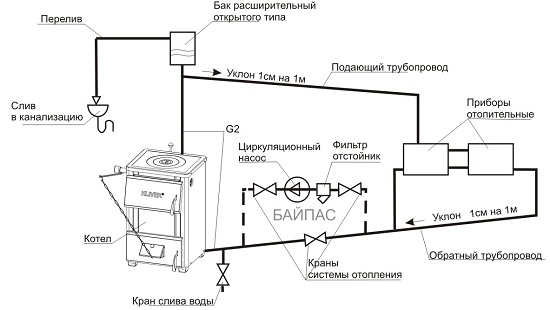
Fig.9.
As a trade-off for being independent from power supply, the open system is quite bulky. Another disadvantage is the inconvenient location of the boiler and expansion tank. Regular checking of the coolant level is also required. As for the boilers used, the boilers in open system have minimal control functions, i.e. It becomes impossible to automatically control such a heating system.
A dependent system, a closed type system, does not have all of the above disadvantages. In this system, the coolant is circulated by an electric pump, and any boiler can be used as a heater. A closed system is easier to control, more compact and easier to install.
Increase 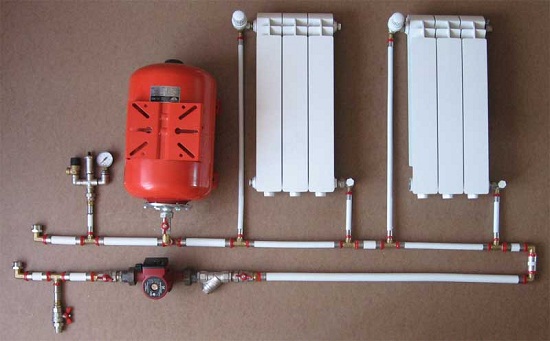
Fig. 10.
In addition to the options for the system itself, there are also different connection diagrams for heating devices. There is a single-pipe, two-pipe and beam scheme. A one-pipe scheme is when all heating devices are connected in series to one pipe. In a two-pipe scheme, heating devices are connected in parallel; this requires the presence of two pipes. In a beam circuit, all devices are connected independently to the collector.
Increase 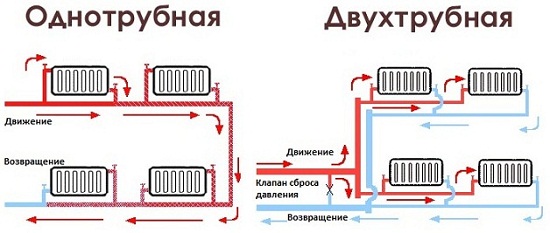
Fig. 11.
From the point of view of saving on material and installation, the best is single-pipe scheme. Its disadvantage is the complex adjustment of the heating system. To get an easily customizable heating system, it is better to choose a two-pipe scheme. If you want to be able to save on heating or install heated floors, then it is better to prefer a radial scheme. In this case, savings are achieved due to the fact that, using a radial circuit, each heating device can be adjusted to its own temperature. Thus in non-residential premises You can maintain a minimum temperature, which results in good savings on heating.
Taking into account all of the above, it becomes possible to answer the question of which heating is better for a home. Better heating one that is the cheapest to operate and does not require constant adjustment to changing climatic conditions.
Before you build country house, you need to focus on the issue of engineering communications. What kind of heating is planned in the house? Of course, you need the most profitable solution in terms of quality, functionality, and service use.
The Network Service company will tell you in detail the advantages of this or that method of heating your home, after first inspecting the object (or the site plan).
So what does it mean optimal heating in a general sense? Firstly, this is a heat supply system that meets all quality parameters and does not destroy your hopes of saving. Let us also add that it is also modern - a system for the use of which you will not have to pay tidy sums of money. By contacting our construction and installation organization, you will receive an optimally selected and configured heating system.
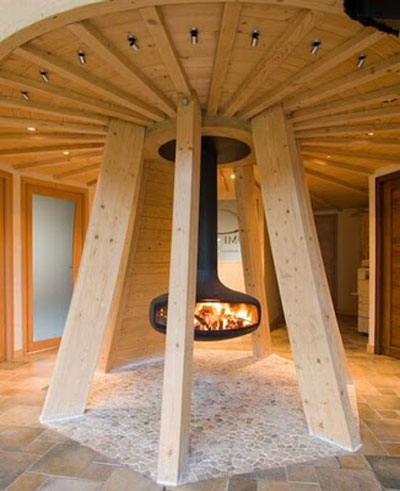
So, having thought about how to choose the most optimal home heating outside the city, you (under the guidance of specialists) will go through several stages of selection. Firstly, this is the choice of the type of heating, secondly, the selection of boiler equipment, thirdly, the purchase of devices and components of the heating system. If you are warmed by the thought of complete independence from public utilities with their eternal problems, you will need it in your home.
Let us consider each stage of selecting the optimal system separately. As for the choice of the type of heating system, everything will depend on the fuel, financial capabilities, and building layout. The fuel (coolant) can be gas, diesel, electricity, etc. Of course, this remains the most popular solution for now. In this case, the installation is standard, and use does not require additional expenses or hassles.

The central component of the heating system is the boiler. Therefore, the quality of heating operation in this case will be determined by the correct choice of boiler. It is also important - the better it was implemented, the more reliably the entire system will serve you. Once our experts advise you on the optimal boiler, you can begin designing the boiler room. This will be followed by installation of heating and commissioning of the entire system as a whole.
When settling in optimal system heating private home, you still need to pay attention to the correct purchase of heating equipment. Nowadays you can find a huge variety of radiators and convectors on the market, differing in material, size, color, and other parameters. appearance and functionality. Sometimes, in individual cases, optimal choice will be in place of certain heating appliances.
No matter what anyone says, optimal heating of a country house– this is what every cottage owner should strive for. Otherwise, comfort will be unattainable. Design engineers and installers of the Network Service company can offer you effective and quite affordable assistance in everything related to the implementation and maintenance of a country-type heating system.
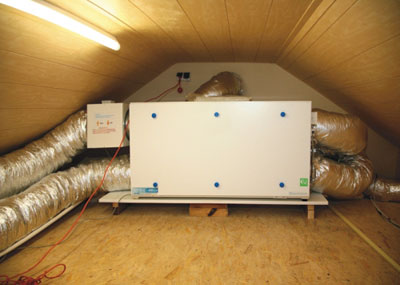
In addition to heating domestic premises, we are establishing various industrial enterprises, as well as heat supply to public buildings. We are ready to go to any site to carry out measurements, calculations, design and turnkey installation of a heating network. Because we are professionals in our field with extensive experience in the field of engineering communications. We value all clients and work conscientiously!
1.
2.
3.
4.
5.
6.
The question of installing a heating system worries many homeowners. What heating is better in a private home, what fuel will be cheaper, what material should the pipes be made of, what is the difference between different models of radiators? This article will discuss the main elements of the heating system, which are presented on modern market. It is only worth noting that the final choice always remains with the home owner, and that there are individual options for heating a private home.
Which heating is better: evaluation criteria
Each person can put their own spin on the concept of “efficient heating of a private home.” eigenvalue, therefore, there is no universal formula for choosing a suitable system. But there are always general criteria, which can be used to determine the most best option"generally".The following requirements apply to modern heating systems:
- The right price-quality ratio. In this case, quality means high efficiency, i.e. the system must provide the building required quantity heat, and its costs should be kept to a minimum.
- Availability of maximum automation. Modern system heating should require minimal intervention during operation. As practice shows, most homeowners prefer to set up the system once and not touch it again. High-quality ones allow you to do this.
- Reliability. The system should be as reliable as possible so that its elements do not have to be updated every six months. In addition, the initial cost of the structure should be as low as possible: few people will agree to use a system whose cost can be compared with the cost of the building itself.
- Easy to install. Installation of the entire system should be simple and require a minimum of costs. In some cases, installation requires specific tools that may not be useful in the long run.
Initial data
There are various ways heating of a private home, and one of the decisive factors when choosing heating will be external conditions. These include the nuances that arise in each specific system, the cost of fuel, taking into account the dynamics of its growth, and the capabilities that each system has.Central heating systems are completely dependent on a remote boiler room, so control temperature regime and the pressure level will not work, but independent heating depends entirely on the user. Most boilers are equipped with devices that allow you to set the coolant temperature within fairly narrow limits.
IN central heating There is also such a phenomenon as the appearance of galvanic pairs. This happens due to the fact that different areas The pipeline is equipped with elements made of metals, which, when interacting, generate a small voltage, leading to increased wear of parts.
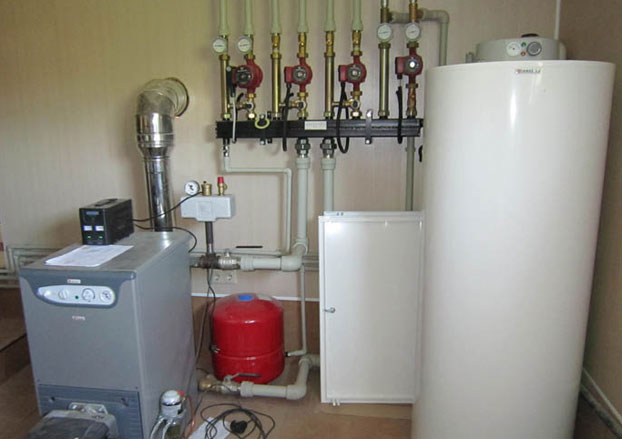
- Main gas.
- Firewood.
- Coal.
- Liquefied gas.
- Used oil.
- Electricity.
But we must not forget that fossil resources are limited, and their cost will no longer decrease, so in the coming years there must be a transition to renewable energy sources.
Today, devices that allow the use of these sources are quite expensive, but the operating costs are very low.
Choosing a heating system for a private home
Initial data has been received and all information on fuel types has been reviewed. Which heating is better in a private home, and how to achieve compliance with the requirements described above and maintain a balance between efficiency and costs? Let's consider all the elements of the system in order.
Heating devices
There is a fairly wide range of heating devices, but the most the best option is a combination of aluminum radiators and water-heated floors, for the installation of which cross-linked polyethylene pipes are used. Why this particular combination? Underfloor heating systems demonstrate greater efficiency when compared with convectors, which is based on better heat distribution (read also: " ").You can even give an example: to warm up a room, radiators need to heat its upper part to 25 degrees, that is, a large amount of heat will be wasted. Warm floors do not have this drawback, heating the space under the ceiling last. Correct adjustment of heated floors and the features of using this design can significantly save money without sacrificing comfort.
The choice of cross-linked polyethylene as a material is primarily due to its high flexibility, and the risk of damaging these pipes when bending is minimal. The cost of the presented material is at a fairly low level, an order of magnitude ahead of its closest opponent - stainless steel.
The only condition for heated floors: There should be no connections in the screed. In addition, to create fittings, an expander is required, the cost of which is quite high, but this problem can be avoided by renting it while the system is being installed.
Despite the described advantages of heated floors, radiators are also needed: firstly, they provide fairly quick heating of the room, and secondly, their use makes it possible to partially eliminate heat leakage through window openings. Installing radiators will help minimize the likelihood of drafts or condensation on windows. Radiators made of aluminum are much more profitable than products made from other materials, since the ratio of heat transfer and cost in these devices is the most optimal.
Pourings and eyeliners
Polypropylene pipes reinforced with aluminum or fiber are well suited for creating bottlings and liners. These products are valued for their simple installation that does not require special equipment. In addition, polypropylene reinforced pipes are durable and strong, which is always positive quality. Of course, you can use regular polypropylene pipes, but reinforced products have much better tensile strength, which can be a very good help in some situations.In addition to the advantages, polypropylene pipes also have disadvantages, the main one being the high coefficient of thermal expansion. To eliminate this problem, compensators are used, which are U-shaped or round bends. Reinforcement reduces expansion to a level comparable to steel products.
The choice of material for reinforcement depends mainly on the wishes of the homeowner. Aluminum foil, according to popular belief, protects the coolant from contact with oxygen, since the walls of the pipeline allow a certain amount of air to pass through, but this opinion may be too exaggerated. The use of fiberglass in this case will be more profitable, since there will be no need to clean the pipe during welding from the remains of melted foil - and this directly affects the ease and speed of installation.

Choosing pipes of a suitable diameter is also topical issue, and here you have to start primarily from the type of heating system used. For example, for heating systems that use natural circulation of liquid, DU32 pipes with an outer diameter of 40 mm are most often used. In structures equipped with a pump, DN20 pipes with an outer diameter of 25 mm can be used.
Connections to heating devices can be made from the same pipes, except in cases where manifold wiring is used: in this case, each radiator has its own pair of pipes, usually 16 mm cross-linked polyethylene products. Practice shows that combining radiant wiring and heated floors in a room is a rather labor-intensive task, and such a design will not receive the title of “the simplest heating of a private house,” but there are cases when manifold connections of heating devices and water heated floors are still used.
Heat source - boiler selection
The issue of choosing a heating boiler usually becomes a much bigger problem than selecting pipes or heating devices. There are a variety of boiler models on the market, each suitable for specific situations. What should you start from when looking through heating options for a private home?For example, if there is no gas main, gas boilers will have to be excluded. Of course, you can extend gas to your site, but the cost of this operation will be too high, and such costs can only become justified in very in rare cases when the system will pay off in the long term.
Gas heating– this is the most profitable heating of a private house. Gas is the cheapest energy resource, and if the main line is already connected, then best source heat will be a condensing boiler combined with an additional circuit that supplies the house hot water. It is quite simple to justify this choice: firstly, it has a fairly high efficiency, which is 10-12% higher than classical solutions.
Secondly, these devices require low temperature in the return circuit of the pipeline, which in this case will be an advantage. Using a storage water heater will allow you to control the temperature much more accurately hot water, and much less raw material will be needed for heating. Often, when calculating a gas heating system, only the heat obtained from gas combustion is taken into account, and if condensation is also taken into account, the design efficiency is simply prohibitive.
The designs described here are just examples of heating a private home, and they depend on a wide variety of parameters. If it is not possible to connect to the gas main, you will have to use a solid fuel boiler equipped with a heat accumulator: in terms of operating costs, such a system takes second position, since firewood and coal are low in cost. In addition, self-procurement of raw materials will provide great savings.
The cost of air conditioners is low and is quite comparable to the cost of a budget heating system. If there is a body of water near the building or in the case when groundwater are on high level, you can use the “water-to-water” scheme, but the cost of such heating will be many times higher than the traditional solution.
The most expensive solution is a geothermal pump, which itself is expensive and requires labor-intensive installation. However, this design is practically independent of external conditions, and the pump service life can reach 30-50 years. Considering the dynamics of rising energy prices, this type of heating of a private home can be a justified decision.
Conclusion
To choose the most efficient heating for a private home, you need to evaluate many factors. The main thing is to remember that the system must provide the rooms with heat and create a cozy atmosphere. The recommendations offered will help when choosing a heating system.





